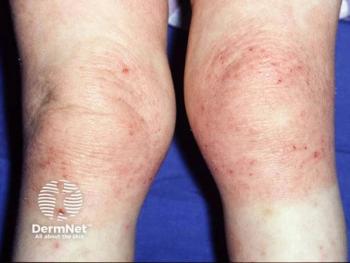
9 Investigators Receive Grants for Eczema Research
The new research will investigate many factors of the skin disease like changes over lifetime, new therapy pathways, and the science behind itch and inflammation.
The National Eczema Association (NEA) recently announced the recipients for its 2021 research grants, including 9 investigators with grants totaling $515,000. The total monetary investment was increased from 2020, where the NEA put forth $310,00 and only 6 recipients were chosen.
The NEA is the largest private nonprofit funder of eczema research and has invested over $2.2 million since its first grant was awarded in 2004,
"Eczema affects over 31 million people in the US alone, many with severe, even debilitating impacts to their life and yet we do not see an appropriate investment in research," said Julie Block, CEO of NEA, Novato, California."We've been working hard to fill this gap, to increase the number of scientists, research projects, and research dollars devoted to eczema which will lead to better therapies, better care, better outcomes—and one day, potentially a cure."
The 4 categories for the grants, and the grant recipients were:
Impact Research Grant – New for 2021, this award provides funding support for collaborative research projects to conduct multi-institution innovative eczema research.
- Concepcio Soler, PhD, University of Barcelona, Barcelona, Spain.
- Analyzing the role of the gene TREX2, a keratinocyte-specific exonuclease, in atopic dermatitis (AD) and evaluation as potential therapeutic target.
Champion Research Grant– Encourages proven researchers to continue research on emerging or ongoing challenges in eczema or bring their expertise to the field of eczema.
- Katrina Abuabara, MD, MA, MSCE, University of California, San Francisco, California.
- Examining dietary salt consumption as a predictor of AD heterogeneity and cardiac comorbidity.
- Wilson Liao, MD, University of California, San Francisco, California.
- Assessing the heterogeneity of eczema across the lifespan using bioinformatics analysis to help determine if there are biomarkers specific for AD in different age groups.
Catalyst Research Grant – Designed to support talented early-career scientists on the path toward becoming the next generation of eczema thought leaders by supporting hypothesis-driven research projects.
- Cameron Flayer, PhD, Massachusetts General Hospital, Boston, Massachusetts.
- Exploring how epidermal interleukin (IL)-3 producing gamma delta T-cells can affect the allergen activation threshold of sensory neurons.
- Sarah Whitley, MD, PhD, University of Pittsburgh, Pittsburgh, Pennsylvania.
- Studying the regulation of skin barrier function by the neuropeptide vasoactive intestinal peptide (VIP).
- Joy Wan, MD, MSCE, John Hopkins Medicine, Baltimore, Maryland.
- Characterizing the relationship between AD severity and behavioral issues in childhood, and its mediation by AD-related symptoms and sleep.
Engagement Research Grant – Intended for emerging investigators exploring a new research concept, piloting a new experiment, or undertaking a novel or secondary data analysis.
- Stephanie Le,MD, MS, University of California, Davis, California.
- Characterizing the glycan alterations associated with IgE responses and AD.
- Ge Peng, MD, Juntendo University Graduate School of Medicine, Tokyo, Japan.
- Exploring the therapeutic effect of the novel antimicrobial peptide (AMP-IBP5) on AD through lipoprotein-receptor related protein 1 regulation.
- Mary Moran, MS, University of Rochester, Rochester, New York.
- Examining the importance of Staphylococcus aureus virulence factors and barrier disruption in susceptibility to eczema herpeticum.
Learn more about NEA's
Reference:
Nine investigators to receive grants for eczema research. Cision PR Newswire. Press Release. Published December 21, 2021. Accessed January 4, 2022.
Newsletter
Like what you’re reading? Subscribe to Dermatology Times for weekly updates on therapies, innovations, and real-world practice tips.











